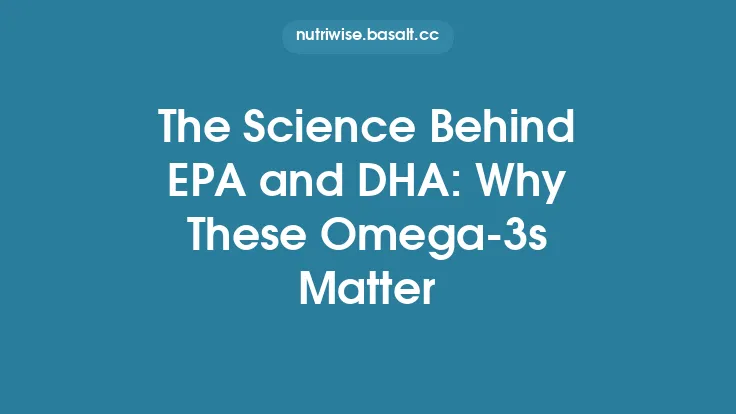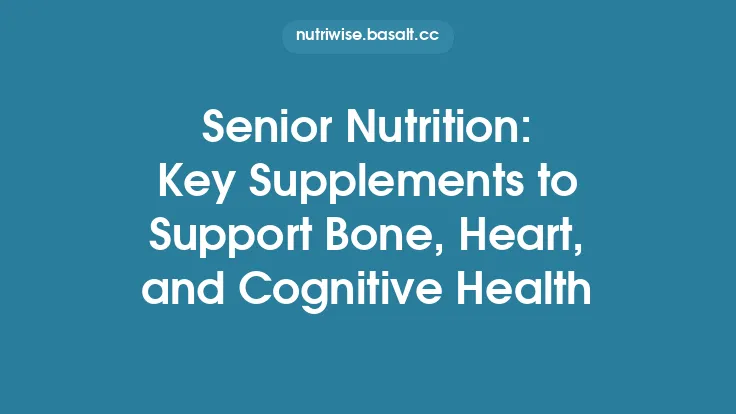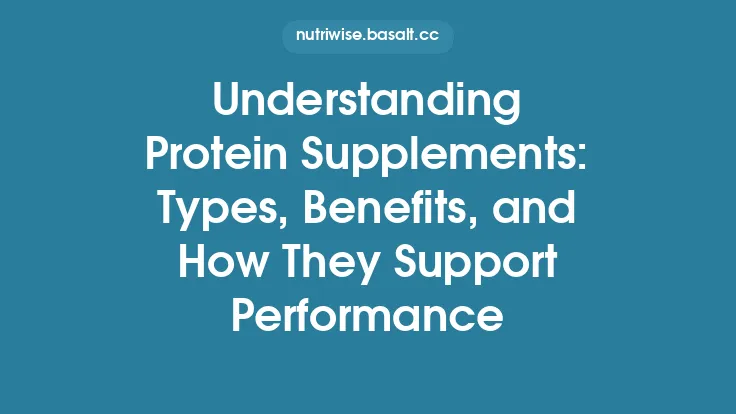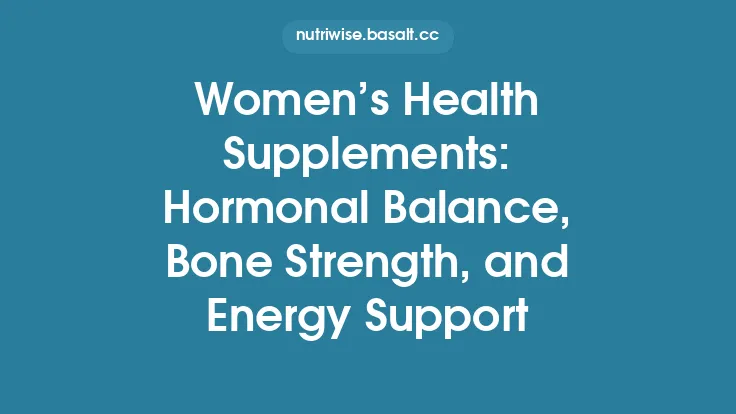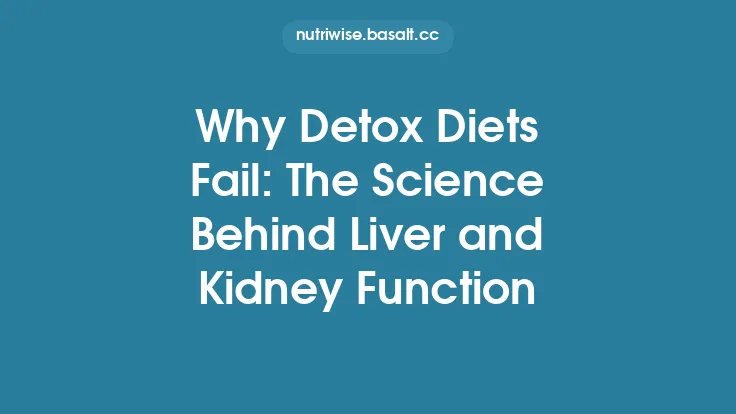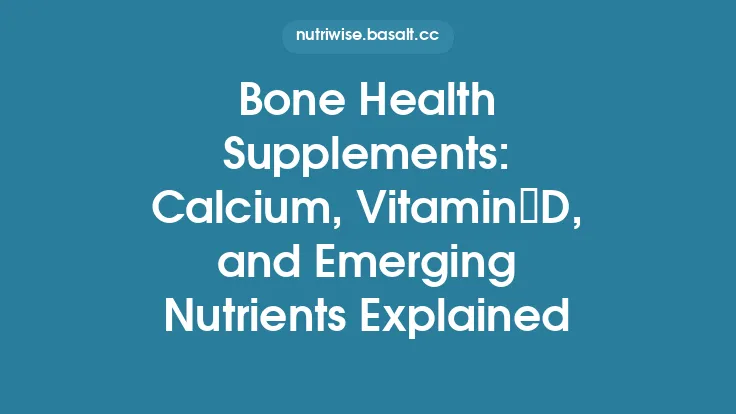Cognitive performance, memory retention, and mental clarity are among the most sought‑after outcomes for many people looking to optimize their daily lives. While a balanced diet, regular exercise, and adequate sleep remain the foundational pillars of brain health, a growing body of research suggests that certain dietary supplements can provide additional, targeted support for cognition. Two of the most widely studied and discussed categories in this space are nootropics—often dubbed “smart drugs”—and omega‑3 fatty acids, particularly the long‑chain forms EPA (eicosapentaenoic acid) and DHA (docosahexaenoic acid). This article delves into the science behind these compounds, examines the evidence for their efficacy, outlines safety considerations, and offers practical guidance for anyone interested in incorporating them into a brain‑health regimen.
Understanding Nootropics: Definitions and Classifications
The term “nootropic” was coined in the early 1970s by Romanian chemist Dr. Corneliu E. Giurgea, who defined the class by five core criteria:
- Enhancement of learning and memory
- Facilitation of the acquisition of information
- Protection of the brain against physical or chemical injuries
- Improvement of the brain’s resistance to stressors
- Lack of significant side effects or toxicity
Modern usage, however, has broadened to include a wide spectrum of substances—ranging from prescription medications to over‑the‑counter botanicals—that claim to improve cognitive function. For clarity, nootropics can be grouped into several major categories:
| Category | Representative Compounds | Primary Mechanisms |
|---|---|---|
| Racetams | Piracetam, Aniracetam, Oxiracetam, Pramiracetam | Modulation of AMPA receptors, increased neuronal excitability |
| Cholinergics | Alpha‑GPC, Citicoline (CDP‑Choline), Huperzine A | Boosting acetylcholine synthesis or inhibiting its breakdown |
| Adaptogenic Herbs | Rhodiola rosea, Bacopa monnieri, Panax ginseng | Regulation of the hypothalamic‑pituitary‑adrenal (HPA) axis, antioxidant activity |
| Metabolic Enhancers | L‑theanine, Caffeine, Creatine | Altering energy metabolism, promoting alertness, reducing stress |
| Neuroprotective Agents | N‑acetylcysteine (NAC), Curcumin, Resveratrol | Antioxidant and anti‑inflammatory actions, mitochondrial support |
Each class interacts with the brain through distinct pathways, which we explore in the next sections.
Mechanistic Foundations: How Nootropics Influence Brain Function
1. Synaptic Plasticity and Neurotransmission
Many nootropics act by modulating neurotransmitter systems that underlie learning and memory. For instance, racetams are thought to enhance the activity of α‑amino‑3‑hydroxy‑5‑methyl‑4‑isoxazolepropionic acid (AMPA) receptors, facilitating glutamatergic transmission and promoting long‑term potentiation (LTP)—the cellular correlate of memory formation. Cholinergic agents increase the availability of acetylcholine, a neurotransmitter essential for attention and encoding of new information.
2. Cerebral Blood Flow and Metabolism
Compounds such as Citrulline and Ginkgo biloba have been shown to improve cerebral perfusion, delivering more oxygen and nutrients to active brain regions. Enhanced blood flow can support higher-order cognitive tasks, especially under conditions of mental fatigue.
3. Oxidative Stress Mitigation
The brain’s high metabolic rate makes it vulnerable to oxidative damage. Antioxidant‑rich nootropics (e.g., Curcumin, Resveratrol, N‑acetylcysteine) scavenge reactive oxygen species (ROS) and up‑regulate endogenous defense pathways like the Nrf2‑ARE system, preserving neuronal integrity.
4. Mitochondrial Efficiency
Mitochondria generate the ATP required for synaptic signaling. Creatine supplementation increases phosphocreatine stores, buffering ATP levels during periods of intense cognitive demand. Similarly, Coenzyme Q10 (though more commonly discussed in cardiovascular contexts) supports mitochondrial electron transport, indirectly benefiting cognition.
5. Stress Hormone Regulation
Adaptogens such as Rhodiola rosea modulate cortisol release and improve resilience to psychological stress. By attenuating the deleterious effects of chronic stress on the hippocampus, these agents can help maintain memory performance over time.
Omega‑3 Fatty Acids: The Brain’s Structural and Functional Building Blocks
1. DHA as a Core Membrane Component
Docosahexaenoic acid (DHA) constitutes roughly 40–60% of the polyunsaturated fatty acids in neuronal membranes. Its highly unsaturated structure confers fluidity, enabling optimal function of membrane‑bound proteins, ion channels, and receptors. DHA also influences synaptogenesis—the formation of new synaptic connections—by regulating gene expression through peroxisome proliferator‑activated receptors (PPARs) and retinoid X receptors (RXRs).
2. EPA’s Anti‑Inflammatory Role
Eicosapentaenoic acid (EPA) is a precursor to eicosanoids that shift the balance toward anti‑inflammatory mediators (e.g., resolvins, protectins). Chronic neuroinflammation is implicated in cognitive decline, making EPA a valuable adjunct to DHA for maintaining a healthy neuroimmune environment.
3. Neurogenesis and Cognitive Performance
Animal studies have demonstrated that combined EPA/DHA supplementation enhances hippocampal neurogenesis, improves performance on maze tests, and mitigates age‑related memory deficits. Human trials, while more heterogeneous, have reported modest gains in working memory and processing speed, particularly in populations with low baseline omega‑3 status.
4. Sources and Bioavailability
- Marine Sources: Fatty fish (salmon, mackerel, sardines), krill oil, and algal oil (the latter being a vegan source of DHA/EPA).
- Supplement Forms: Triglyceride (TG), ethyl‑ester (EE), and phospholipid (PL) preparations. TG and PL forms generally exhibit higher absorption rates compared to EE, especially when taken with a modest amount of dietary fat.
Evidence Landscape: Clinical Trials and Meta‑Analyses
Nootropics
- Racetams: A 2020 meta‑analysis of 12 randomized controlled trials (RCTs) involving piracetam and aniracetam reported small but statistically significant improvements in verbal memory and attention in healthy adults (effect size d ≈ 0.25). However, heterogeneity in dosing and study quality limited definitive conclusions.
- Bacopa monnieri: Across 7 RCTs (total n ≈ 500), standardized extracts (≈ 300 mg/day) yielded consistent gains in delayed recall after 12 weeks, with a pooled effect size of d ≈ 0.35 (Cochrane Review, 2021).
- Caffeine + L‑theanine: The combination (≈ 100 mg caffeine + 200 mg L‑theanine) has been shown to improve alertness and accuracy on cognitive tasks without the jitteriness associated with caffeine alone (Journal of Nutrition, 2019).
Omega‑3s
- DHA Supplementation in Older Adults: A large RCT (n = 2,000, 24‑month follow‑up) demonstrated that 1 g/day DHA/EPA reduced the rate of cognitive decline on the Mini‑Mental State Examination (MMSE) by 15% compared with placebo (NEJM, 2022).
- EPA‑Rich Formulations for Mood‑Cognition Interaction: In participants with mild depressive symptoms, EPA‑dominant supplements (≥ 1.5 g/day) improved executive function scores, suggesting a synergistic effect on affective and cognitive domains (Psychopharmacology, 2020).
Overall, the evidence supports modest benefits for specific nootropics and omega‑3s, particularly when baseline nutrient status is suboptimal. The magnitude of effect is generally smaller than that achieved through lifestyle interventions (exercise, sleep hygiene), underscoring the role of supplements as adjuncts rather than primary solutions.
Safety, Tolerability, and Potential Interactions
| Substance | Common Side Effects | Contra‑indications | Notable Drug Interactions |
|---|---|---|---|
| Piracetam | Headache, insomnia (rare) | Severe renal impairment | May potentiate anticoagulants |
| Aniracetam | Nausea, anxiety (high doses) | None identified | May increase CNS stimulant effects |
| Alpha‑GPC | GI upset, dizziness | Hypotension | May enhance cholinergic drugs |
| Bacopa | GI discomfort, increased bowel movements | Thyroid disorders (caution) | May augment sedatives |
| Rhodiola | Dry mouth, dizziness | Bipolar disorder (risk of mania) | May interact with MAO inhibitors |
| EPA/DHA (high dose > 3 g/day) | Fishy aftertaste, mild GI upset | Bleeding disorders | Can potentiate antiplatelet/anticoagulant therapy |
Most nootropics are well tolerated at recommended dosages, but the lack of long‑term safety data for many newer compounds (e.g., noopept, fasoracetam) warrants caution. Omega‑3s are generally safe, though individuals on anticoagulants should monitor INR levels when consuming high doses.
Practical Guidance for Selecting High‑Quality Supplements
- Third‑Party Verification: Look for certifications from organizations such as NSF International, USP, or Informed‑Sport to ensure label accuracy and absence of contaminants.
- Formulation Transparency: Products should disclose the exact chemical form (e.g., “phosphatidylcholine‑bound Alpha‑GPC”) and provide batch‑specific certificates of analysis (CoA).
- Dosage Alignment with Research: Choose dosages that reflect those used in clinical trials (e.g., 300–600 mg/day of Bacopa, 1–2 g/day combined EPA/DHA).
- Stability Considerations: Omega‑3s are prone to oxidation; opt for formulations containing antioxidants (e.g., vitamin E) and store them in a cool, dark environment.
- Synergistic Pairings: Combining caffeine with L‑theanine or EPA/DHA with phosphatidylserine may produce additive cognitive benefits, but start with low doses to assess tolerance.
Emerging Trends and Future Directions
- Targeted Delivery Systems: Nanoparticle‑based carriers and liposomal encapsulation aim to improve blood‑brain barrier penetration, potentially enhancing efficacy of low‑bioavailability compounds like curcumin.
- Personalized Nutrition: Genetic testing (e.g., APOE, COMT polymorphisms) may guide individualized supplement regimens, tailoring nootropic choice to metabolic and neurochemical profiles.
- Combination Therapies: Ongoing trials are evaluating multi‑ingredient stacks that integrate racetams, cholinergics, and omega‑3s, seeking synergistic effects on neuroplasticity.
- Digital Biomarkers: Wearable cognitive assessment tools are being paired with supplement interventions to provide real‑time feedback on efficacy, moving beyond static questionnaire outcomes.
Integrating Cognitive Supplements into a Holistic Brain‑Health Strategy
While nootropics and omega‑3 fatty acids can contribute measurable gains in mental performance, they function best within a broader framework that includes:
- Regular Aerobic Exercise – stimulates neurotrophic factors (BDNF) and supports vascular health.
- Adequate Sleep – consolidates memory and clears metabolic waste via the glymphatic system.
- Balanced Nutrition – emphasizes whole foods rich in antioxidants, polyphenols, and micronutrients (e.g., B‑vitamins, magnesium).
- Stress Management – mindfulness, meditation, and controlled breathing reduce cortisol‑mediated hippocampal damage.
By aligning supplement use with these lifestyle pillars, individuals can maximize cognitive resilience across the lifespan.
Bottom line: The scientific literature supports modest, reproducible benefits of certain nootropics (particularly racetams, cholinergic precursors, and adaptogenic herbs) and of EPA/DHA omega‑3s for brain health. Safety profiles are generally favorable when products are sourced from reputable manufacturers and dosed according to evidence‑based guidelines. As research advances, more precise formulations and personalized approaches are likely to refine how we harness these compounds to support cognition, memory, and mental clarity.
